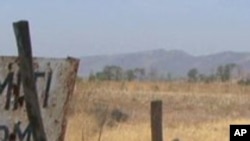Almost 10 years ago, Zimbabwe embarked on a controversial land reform program that the government said was aimed at distributing fertile farmland owned by a few thousand white farmers to thousands of impoverished black Zimbabweans. The government said the land had been taken illegally from black Zimbabweans during the colonial era and it was righting a historic wrong. But white farmers say they purchased the land and own legal title under a system set up by colonial Britain 100 years ago and accepted by Zimbabwe's government at independence in 1980. The program continues and is still marked by controversy. Critics blame it for the country's economic decline. But Mr. Mugabe and his ZANU PF party say western sanctions are to blame.
Evening is falling at Spring Farm in Karoi, about 200 kilometers north of Harare. Owner Temba Mliswa is bringing his herds in for the night.
He received 800 hectares seven years ago under Zimbabwe's land reform program. It nationalized some 4500 commercial farms owned by white farmers and distributed them to thousands of black Zimbabweans.
Mliswa farms tobacco, maize and beans and raises cattle, goats and sheep. "The whole land reform is noble and I think there will always be a debate, when was it supposed to happen, when was it not suppose to happen. For me, I am a product of the land reform. I've done well. I've done more than the white farmers used to do," he said.
Mliswa took over the farm after the previous owner, Alan Parsons, was beaten and driven away by a gang. Mliswa also took ownership of the buildings, cattle and other facilities that were not supposed to be part of the redistribution. Parsons, according to several farmers, received no compensation and now lives in Australia.
John Worsick was also driven off his farm. He founded the Justice for Agriculture Trust.
He says President Robert Mugabe's ZANU-PF party launched the land program for political reasons.
"Mugabe knows that he has lost the support he had. The support was traditionally from rural areas," Worsick says, "He knows he has lost that. But he believes emphatically that he can, not win that back, but he can turn it back to him through a terror campaign, intimidation and terror out there, coupled to food, controlling food out there."
Critics say land seizures are largely responsible for the 40 percent drop in economic production in Zimbabwe over the past decade. They contend that very few of the seized farms are commercially productive. And they say a large number of black farm workers left the farms when ownership was transferred, fueling the country's 90 percent unemployment rate.
Mr. Mugabe and ZANU-PF leaders, whose families own some of the largest farms, blame the economic decline on western sanctions imposed on Zimbabwe because of human rights violations.
Farm seizures intensified this year after Mr. Mugabe entered into a power sharing arrangement with former opposition leader and now Prime Minister Morgan Tsvangirai, who says the seizures should stop.
The violence linked to them continues.
In Chegutu, north of Harare, the farms of Ben and Laura Freeth and her parents were burnt under mysterious circumstances. "They broke into my parents' house in April on three occasions. There was a break-and-entry charge. They were not arrested. Our workers were assaulted. One guy's head was fractured. The other guy, they broke his feet. No arrests made. And all the crops stolen, all the equipment stolen," Laura said.
Virginia Sibanda supervised a sewing cooperative on the farm that made linens and tablecloths. Everything was lost in the blaze. "Right now we are clearing the ashes because we no longer have work to do," she says, "All the materials and finished items were gutted in the blaze."
Many people were disturbed by the violence that accompanied the seizures. But farm-owner Temba Mliswa says it happened because the owners resisted the transfer. "I've never known a revolution that has no blood. And this is something that of course was a revolution and it had blood on both sides," Mliswa says, "You also had blacks being killed in the process, whites being killed in the process."
University of Zimbabwe Professor Eldred Masunungure says support for land reform is widespread because a small minority was seen as controlling most of the good land.
"It's a recipe for social and political disaster and upheaval," Masunungure says, "So in terms of the principle of land reform, that is accepted across the board. But the method, the methodology of doing so is where there is contestation."
Some experts say compensation for farmers who lost their farms should be examined.
In addition, they say land re-distribution has stripped Zimbabwean agriculture of many of its best farmers and that black farmers should be helped to gain the skills they need to operate successful commercial farms.
But without the help of the displaced farmers that will take time.




